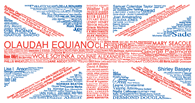Mary Seacole
(1805-1881) the daughter of a free black woman and Scottish soldier, was born in Kingston, Jamaica. At an early age she learned traditional medicine from her mother, and soon earned a reputation as a skilled healer/doctor. In 1851 she joined her brother in Panama during the goldrush playing a vital part in the nursing of a cholera epidemic.
On arrival in London in 1854, she heard of the collapse in the nursing system in the Crimea. Mrs Seacole immediately offered her services and experience but was rejected on the grounds of her colour. She eventually financed her own journey to the Crimea where she opened a camp and store providing medicine to the wounded.
On her return she found herself penniless. Many soldiers contributed in organising a benefit in her name, insistent that her work was not to be forgotten. On the twenty-fourth of November, 1856, The Times published a letter stating: "While the benevolent deeds of Florence Nightingale are being handed down to posterity...are the humble actions of be entirely forgotten".
The Wonderful Adventures of Mrs Seacole in Many Lands (first published in 1857) recalls her experiences in London, The Crimean War, the Caribbean and America. It is invaluable as a chronicle of black female experience in the Nineteenth Century.
Mrs Seacole was a woman of courage, strength, determination and humility. Whilst in the Crimea she won the love and respect of soldiers of all ranks who became dependant on her. She is buried in St. Mary’s Catholic Cemetery, Harrow Road, London.

 Diane Abbott MP
Diane Abbott MP Baroness Valerie Amos
Baroness Valerie Amos Dr Joan Anim-Addo
Dr Joan Anim-Addo Floella Benjamin OBE
Floella Benjamin OBE Malika Booker
Malika Booker E.R. Braithwaite
E.R. Braithwaite Judith Bryan
Judith Bryan Vic Charles MBE
Vic Charles MBE Olaudah Equiano
Olaudah Equiano Lenford Garrison
Lenford Garrison Doris Harper-Wills
Doris Harper-Wills Jessica Huntley
Jessica Huntley C.L.R. James
C.L.R. James Isaac Julien
Isaac Julien Sam King
Sam King George Lamming
George Lamming Lennox Lewis
Lennox Lewis Sir Trevor McDonald OBE
Sir Trevor McDonald OBE Jeff Morris
Jeff Morris Courttia Newland
Courttia Newland Paul Robeson
Paul Robeson Trevor Robinson
Trevor Robinson Mary Seacole
Mary Seacole Ty
Ty Benjamin Zephaniah
Benjamin Zephaniah
